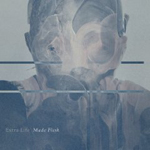|
|
 |
Dusted Reviews
Artist: Extra Life Album: Made Flesh Label: Lo Recordings Review date: Mar. 30, 2010 |

|
|
|
 |
Existential terror is a rather difficult feeling for a piece of art to inspire. For it to work, the artpiece has to be able to pull the audience out of their selves and place them in the point of view of a foreign mind. The foreign mind has to logically inhabit the same space as the audience but be far enough from standard worldviews that it causes a crisis. A crisis of conscious, a crisis of self – some sundering between the audience and how they actually exist. The simultaneity of existing as oneself and existing as this foreign presence is what causes this terror, and in the hands of the right artist, it can be something worthwhile to feel.
The author Brian Evanson and British television producer Christopher Morris – especially on his sketch show Jam – are quite adept being able to really inspire this terror, and listening to Extra Life’s second album Made Flesh really brings them to mind. Made Flesh is a theatrical album. A mix of avant-prog, pop and religious music, the album announces its intentions from the outset with a bombastic strangeness. From that moment on, it pulls listeners out of their headspace and places them in this menacing world. Extra Life leader Charlie Looker’s vocals and the periling feeling of the music continually push at each other to heighten the anxiety in their audience.
A lot of atonal music is good at inspiring anxiety. Since we’re so used to harmony and associate it with a pleasant feeling, music that breaks those expectations or doesn’t conform to them tends to set us on edge. Even when expecting something atonal, the cultural standards are still alive within us. More anxiety-producing than the way Extra Life composes, however, is the way Looker sings. There’s still a lot of pop mechanics in the music, but Looker’s voice and vocals have this creepy urgency to them, especially in “Made Flesh” and “Easter.” Beyond that though, there’s a religiosity to his singing – like the a capella in “The Ladder” – bringing to mind religious singing or Middle Eastern modes of music, especially Judaic chanting. The insinuation of the religious produces a lot of tension and anxiety, both for the Earthly connotations that religion holds and the immanent ones.
One might ask why we need art like this, art that produces dread and foreboding, art that violently pulls the audience out of themselves. In that very formulation, though, is the answer. Without this tension, without artworks that inspire it, we never leave ourselves. We are constantly stuck inside all the time. It’s only with the feeling that Made Flesh evokes that we can actually get a better view of ourselves and why we think like we do.
By Andrew Beckerman
|







